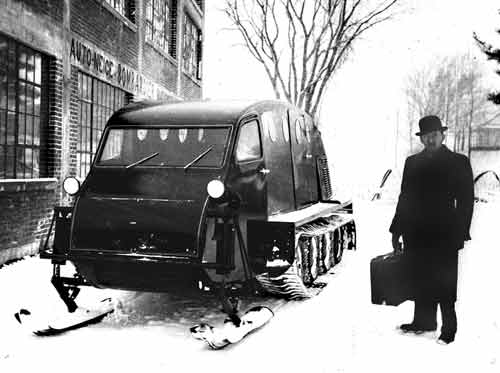|
When I was a high school student in our little town of Lestock Saskatchewan in 1950 our town doctor made house calls in the winter with his bombardier. He had a driver, Joe Lucas, and his service area was about 25 miles in diameter, frequently bad or no available roads were passable other than as you can see with the bombardier. His role was crucial because despite our town's small size we had the only hospital in the area and the vehicle could also transport patients if need be. Our doctor, Chuck McCullough was a good friend of our family and for a young boy the imagined romance connected with the saving grace of rescuing the sick, bounding over drifts of snow, over fences trapping snow, in blizzard conditions was inspiring. It may have been the single most important matter that captured my desire to go into medicine. It tells us once again that the ability of a solo practitioner managing such a large area by himself, treating a large farm population in a hospital and at home with his own hands and own brain was crucial. This was the state of affairs in the country practice in the winter of 1950 in rural Saskatchewan. Who wouldn't be swept up with this kind of life and this kind of effort.Talk about value. Priceless.
0 Comments
Having read Wikipedia I was refreshed with the original description of factoid, a word with the suffix "oid" meaning "resembling or like". Resembling or like a fact, is not a fact. It may be mistaken for a fact but it isn't . However, unfortunately the newer definition of factoid is a fact that is merely trivial or less germane. It's better that a fact that is trivial or marginally germane be called a factlet . This is not yet a word but could be.I like the original word and definition which was originally concocted by Norman Mailer and he was clear that a factoid was not a fact. The modernized definition of factoid allows use of the word for the simple reason that none has made it out of the bush that is better. However, better that the trivial fact should be described as a factlet was suggested by William Safire. "Let" is a suffix that means a diminutive like piglet and a marginally germane or trivial fact fits a factlet. Whatever is happening now to information, we are subjected to colossal collections of factlets and all factoids that we must sort through. The need for these words arise because of the repeated hammering by fake news. The information age allows the diminutive size of the factlets to slip through apertures in the loose web. I believe that "terms of definition" will help us sort it out. Words matter.
Were you aware that the first production of oxygen in the atmosphere was by the first plant-like form on earth, the Lichen? The Lichen is a composite of a fungus and a cyanobacteria or blue green algae that live in a symbiotic relationship, the fungus harboring and moisture producing while drawing sugar from the algae. Possibly a paradox like the baby nourishing the nursing mother. The algae, an anaerobe, produces oxygen and sugar by way of photosynthesis, CO2+H2O producing free oxygen that is usable. Moreover the O2 molecule when unstable produced free radical O that combined with O2 to produce O3 (Ozone) a layer that resists ultraviolet rays from the sun that can kill. That the lichen is the first plant-like form on earth is clear from fossil records and the appearance of oxygen seen from ferrous mineral records at the same time, tells us of the importance of this gift that would grow on bare rock and eventually produce the gas of life for the animal world and provide our protection from ultraviolet rays. In 2011 I wrote a poem celebrating the Lichen in my book An Elderly Eclectic Gentleman. I called the poem Succession and will repeat it here since we owe the Lichen so much. Please bear with me because if the foregoing doesn't thrill you much, it does me.
The Lichen grows on bare rock, no earth, little sustenance, a tenuous foothold to life. It asks for sun and time and grows, defeated, grows again. It rains, it grows, summer drought comes, it dies, to grow again with rain. And when it dies it leaves a little behind. Soil? Or is it the merest memory of Lichen becoming soil?l So.Mosses grow, a succession plant, thicker, greener, richer because of the poor precursor which took a foothold where no other could. The foregoing tells you that CO2 was drawn from the atmosphere to produce oxygen. , |
Categories
|

 RSS Feed
RSS Feed